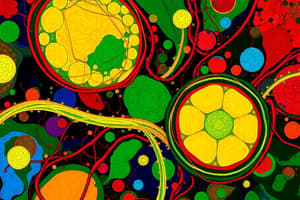Podcast
Questions and Answers
What is the primary function of chloroplasts in photosynthesis?
What is the primary function of chloroplasts in photosynthesis?
- To synthesize proteins
- To convert light energy into chemical energy (correct)
- To store glucose
- To absorb carbon dioxide
Where do the light-dependent reactions of photosynthesis occur?
Where do the light-dependent reactions of photosynthesis occur?
- In the outer membrane of chloroplasts
- In the thylakoid membranes (correct)
- In the stroma
- In the cytoplasm
Which substance is produced as a byproduct of photolysis during the light-dependent reactions?
Which substance is produced as a byproduct of photolysis during the light-dependent reactions?
- Glucose
- Oxygen (correct)
- ATP
- Carbon dioxide
What role do ATP and NADPH play in photosynthesis?
What role do ATP and NADPH play in photosynthesis?
What is the significance of chlorophyll in the photosynthesis process?
What is the significance of chlorophyll in the photosynthesis process?
Which component of chloroplast structure is responsible for housing the light-dependent reactions?
Which component of chloroplast structure is responsible for housing the light-dependent reactions?
What environmental condition is necessary for the light-dependent reactions to occur?
What environmental condition is necessary for the light-dependent reactions to occur?
What defines the thylakoid membranes in chloroplasts?
What defines the thylakoid membranes in chloroplasts?
What is the primary role of RuBisCO in the Calvin Cycle?
What is the primary role of RuBisCO in the Calvin Cycle?
Which of the following processes occurs during the Calvin Cycle?
Which of the following processes occurs during the Calvin Cycle?
In a photosynthesis experiment, what would be considered an independent variable?
In a photosynthesis experiment, what would be considered an independent variable?
What is typically measured as a dependent variable in photosynthesis experiments?
What is typically measured as a dependent variable in photosynthesis experiments?
Which compound is formed directly after RuBP is fixed with carbon dioxide?
Which compound is formed directly after RuBP is fixed with carbon dioxide?
What occurs to some G3P molecules in the Calvin Cycle?
What occurs to some G3P molecules in the Calvin Cycle?
What does the stroma of the chloroplast contain?
What does the stroma of the chloroplast contain?
Which of the following statements regarding light-independent reactions is true?
Which of the following statements regarding light-independent reactions is true?
Flashcards are hidden until you start studying
Study Notes
Photosynthesis
- Biochemical process where plants, algae and some bacteria convert light energy into chemical energy
- Produces glucose and oxygen as byproducts
- Foundation of life on Earth - powers most ecosystems and produces oxygen
Chloroplasts
- Organelles where photosynthesis occurs
- Contain chlorophyll - pigment that absorbs light (blue and red wavelengths)
- Chlorophyll absorbs light energy and transfers it into a chemical form that the plant can use to make glucose.
- Outer membrane, inner membrane and thylakoid membrane
- Thylakoids are stacked into structures known as grana
- Space around grana is called stroma
- Light-dependent reactions occur in the thylakoid membranes
- Light-independent reactions occur in the stroma
### Light-Dependent Reactions
- First stage of photosynthesis and occurs in thylakoid membranes
- Photons are absorbed by chlorophyll
- Energy excites electrons which are passed along the electron transport chain
- Water molecules are split (photolysis) releasing oxygen and provides the electrons to replace those lost by chlorophyll
- Excited electrons are used to create ATP and NADPH, energy carriers for the next stage
- These reactions require light
Light-Independent Reactions (Calvin Cycle)
- Second stage of photosynthesis and occurs in the stroma
- Doesn't require light directly
- RuBisCO fixes carbon dioxide from the atmosphere by attaching it to a 5-carbon sugar, RuBP
- The resulting compound is broken down into two molecules of 3-phosphoglycerate (3-PGA)
- 3-PGA converted into glyceraldehyde-3-phosphate (G3P), a 3-carbon sugar.
- Some G3P molecules exit to form glucose and other carbohydrates, while others are recycled to regenerate RuBP
Scientific Investigation
- Scientists often experiment with different variables to understand how photosynthesis works
- Independent variable: factor you change or manipulate
- Dependent variable: factor you measure in response to changes in the independent variable
Example of a Photosynthesis Experiment
- Independent variable: would be light intensity
- Dependent variable: would be rate of oxygen production
- Collect data by measuring the amount of oxygen produced in a set period
Studying That Suits You
Use AI to generate personalized quizzes and flashcards to suit your learning preferences.




